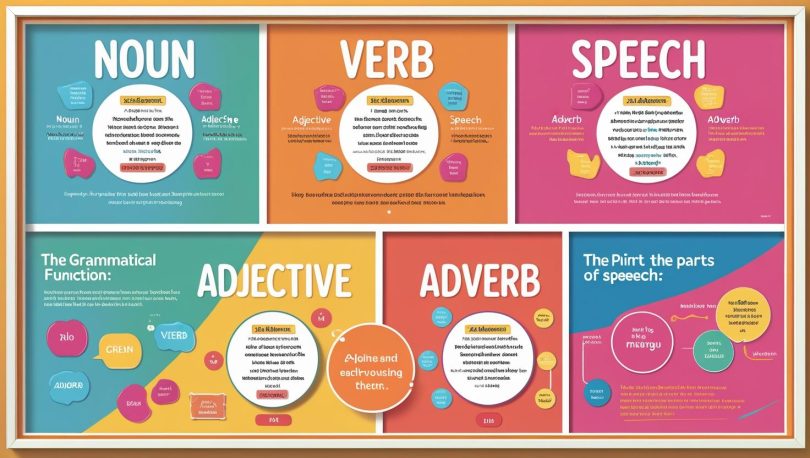Have you ever gotten confused about nouns, verbs, adjectives, and adverbs in English grammar?
Don’t worry — we’re going to break it down simply with clear explanations and easy examples.
🔹 What is a Noun?
A noun is a naming word — it names a person, place, or thing.
Examples:
✅ Person (Sarah, Michael)
✅ Place (Dhaka, USA)
✅ Thing (cat, book, phone)
🔹 What is an Adjective?
An adjective is a describing word — it adds details about a noun.
Example:
✅ A black (adjective) cat (noun)
✅ I am (verb) happy (adjective).
🔹 What is a Verb?
A verb shows action or a state of being.
Examples:
✅ Run, walk, jogging — action words
✅ “I walk quickly.” (Here, walk is a verb)
🔹 What is an Adverb?
An adverb describes a verb, adding information about how, when, or where something happens.
Example:
✅ “I walk quickly.” (quickly is an adverb describing walk)
✅ “I sing loudly.” (loudly is an adverb describing sing)
🔹 Final Examples (for practice)
✅ Noun: The cat (noun) is tired (adjective).
✅ Adjective: I (noun) am (verb) happy (adjective).
✅ Verb: He (noun) runs (verb) every day.
✅ Adverb: She (noun) speaks (verb) confidently (adverb).
🔹 For More English Tips:
➡ Check IELTS LIZ for more English grammar lessons, IELTS preparation strategies, and practice questions.
Noun, Verb, Adjective, or Adverb
Noun — Person (Any name), Place (Any City, Country Name), Thing (Any living or alive object)
Adjective —- Describes a noun (A black(adj) cat)
Verb—– Action Word (Run, Jogging)
Adverb— Describes a verb (Help to verb)
Verb —- I walk quickly (adj).
Adverb — I sing loudly(adj).
Noun —- The cat(n) is(v) tired(adj).
Adjective —– I(n) am(v) hot(adj).
🔹 Why Are Noun, Verb, Adjective, and Adverb Important?
Noun, verb, adjective, and adverb form the foundation of English sentence structure.
Every sentence you speak or write comprises these components in some combination.
They help us express who or what, what is happening, how it’s happening, and more details about people, places, or actions.
🔹 Tips to Identify Each Part of Speech
Here are a few helpful tips to quickly identify whether a word is a noun, verb, adjective, or adverb:
✅ Noun:
➥ Ask: “Who or what?”
➥ If the answer is a person, place, or thing, it’s a noun.
➥ Examples:
- Who? – Anna (noun, person)
- Where? – London (noun, place)
- What? – Chair (noun, thing)
✅ Verb:
➥ Ask: “What action is happening?” or “What is this person or thing doing?”
➥ If it shows an action or state of being, it’s a verb.
➥ Examples:
- Run (action)
- Sleep (action)
- Is (state of being)
✅ Adjective:
➥ Ask: “What kind?” or “How much?”
➥ If it answers these questions about a noun, it’s an adjective.
➥ Examples:
- Black (color)
- Happy (emotion)
- Small (size)
✅ Adverb:
➥ Ask: “How?” “When?” “Where?” or “To what degree?”
➥ If it adds information about a verb, adjective, or another adverb, it’s an adverb.
➥ Examples:
- Slowly (how?)
- Yesterday (when?)
- Very (to what degree?)
🔹 Why It’s Important to Understand Parts of Speech
Understanding these components of a sentence is key to:
✅ Writing clear, accurate English:
Using proper nouns, verbs, and modifiers makes your writing more elegant and precise.
✅ Scoring Higher in IELTS:
For IELTS exams, having a strong knowledge of grammar and parts of speech helps you form complex, error-free sentences — and this directly influences your score in writing and speaking.
✅ Effective Communication:
Correctly identifying and using these components lets you convey your thoughts accurately, reducing confusion and making sure your messages are understood.
🔹 Final Tip – Combine Your Skills
Once you know the roles of nouns, verbs, adjectives, and adverbs, you can:
✅ Combine them to create rich, vivid sentences.
✅ Improve your writing style by adding details and depth.
✅ Expand your vocabulary, making your IELTS responses more sophisticated and natural.

If you’d like me to proceed with any of these, please just let me know from the site techtweet.xyz! Also if you need to learn something new than subscribe YouTube : ASP.NET With SQL SERVER

